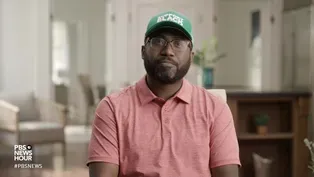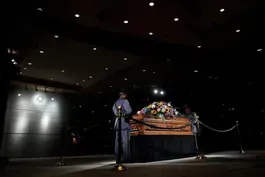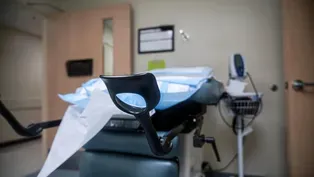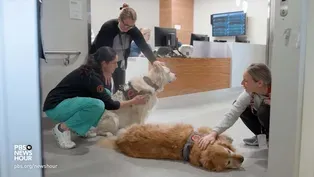
Negotiations continue to extend cease-fire, hostage release
Clip: 11/28/2023 | 6m 30sVideo has Closed Captions
Negotiations continue to extend cease-fire and expand hostage release
Tuesday was the day the war could have resumed in Gaza with an initial truce set to expire. Instead, it was the fifth day of a pause in fighting, the fifth day of Hamas releasing mostly Israeli hostages, Israel releasing 30 detained Palestinians and more aid arriving in Gaza. Nick Schifrin reports.
Problems with Closed Captions? Closed Captioning Feedback
Problems with Closed Captions? Closed Captioning Feedback
Major corporate funding for the PBS News Hour is provided by BDO, BNSF, Consumer Cellular, American Cruise Lines, and Raymond James. Funding for the PBS NewsHour Weekend is provided by...

Negotiations continue to extend cease-fire, hostage release
Clip: 11/28/2023 | 6m 30sVideo has Closed Captions
Tuesday was the day the war could have resumed in Gaza with an initial truce set to expire. Instead, it was the fifth day of a pause in fighting, the fifth day of Hamas releasing mostly Israeli hostages, Israel releasing 30 detained Palestinians and more aid arriving in Gaza. Nick Schifrin reports.
Problems with Closed Captions? Closed Captioning Feedback
How to Watch PBS News Hour
PBS News Hour is available to stream on pbs.org and the free PBS App, available on iPhone, Apple TV, Android TV, Android smartphones, Amazon Fire TV, Amazon Fire Tablet, Roku, Samsung Smart TV, and Vizio.
Providing Support for PBS.org
Learn Moreabout PBS online sponsorshipGEOFF BENNETT: Welcome to the "NewsHour."
Today was the day the war could have resumed in Gaza, with an initial truce set to expire.
AMNA NAWAZ: Instead, it is the fifth day of a pause in fighting, the fifth day of Hamas releasing mostly Israeli hostages, Israel releasing 30 detained Palestinians, half of them women, and more aid arriving into Gaza.
Nick Schifrin begins our coverage.
NICK SCHIFRIN: As a fifth day of armistice allowed the fifth release of mostly Israeli hostages from Gaza, and 30 Palestinians from military detention in the West Bank, there is a diplomatic push tonight to extend the pause.
In Doha, CIA Director Bill Burns met with his Israeli counterpart David Barnea.
One of their goals, expand the hostage release agreement beyond foreign workers and Israeli women and children that have so far been released to the more than 100 Israeli male hostages being held in Gaza.
Hamas has indicated it is interested.
The negotiations are mediated by Qatar.
MAJED BIN MOHAMMED AL ANSARI, Qatari Foreign Ministry Spokesman: We are hopeful that, in the next 48 hours, we will be getting more information from Hamas regarding the rest of the hostages.
NICK SCHIFRIN: In Israel, public sentiment is mixed.
MEIRAV RAMOT, Israeli Resident: We need all of them back home.
If a truce is what will get them home, yes.
MICHAEL REICHAL, Israeli Resident: In two days, we should stop the cease-fire and go back to war and for -- get rid of Hamas.
NICK SCHIFRIN: Prime Minister Benjamin Netanyahu is holding on to both goals, even if most analysts believe they're contradictory.
BENJAMIN NETANYAHU, Israeli Prime Minister (through translator): We are committed to completing our tasks, the release of all the abductees, the elimination of this terrorist organization above and below the ground.
And, of course, Gaza will not return to what it was and will not pose a threat to the state of Israel.
NICK SCHIFRIN: Today, humanitarian groups warned that the 49 days of war that preceded the pause had pushed Gaza to -- quote -- "absolute chaos."
During the pause, we filmed Gazans who'd stayed in the north and finally decided to evacuate south.
They walk for miles, the injured, the vulnerable, the grieving.
This is Fatima.
FATIMA, Displaced Gazan (through translator): Nineteen members from my household, hundreds under the rubble.
We are from Sabra, three families I swear, killed.
NICK SCHIFRIN: This is Amal.
She says her son died in an Israeli airstrike.
AMAL, Displaced Gazan (through translator): They are treating us like animals.
They tell us to raise our hands in the sky while walking, take our belongings from us.
We are suffering a lot.
I can't take my breath because I keep walking.
NICK SCHIFRIN: A U.N.-led consortium today estimated Israeli airstrikes had damaged or destroyed 60 percent of all of Gaza's housing.
A senior administration official today warned that any Israeli operation in Southern Gaza would have to be a -- quote -- "different type of campaign" and avoid significant further displacement.
More than three-quarters of all of Gaza is displaced, helping spread disease, the WHO warned today.
DR. MARGARET HARRIS, World Health Organization: So, eventually, we will see more people dying from disease than we are even seeing from the bombardment, if we are not able to put back this health system and provide the basics of life, food, water, medicines, and, of course, fuel to operate the hospitals.
NICK SCHIFRIN: Meanwhile, in Southern Gaza, today's hostage release included for the first time those held by Palestinian Islamic Jihad, a group labeled by the United States a terrorist organization.
We also learned more today about how the hostages have been held.
Israel's Channel 13 aired an interview with Ruthi, or Ruth, Munder, who was held overground in Gaza and released with her daughter Keren and grandson Ohad, who reunited with family on Saturday.
RUTH MUNDER, Released Hostage (through translator): We were held in a suffocating room.
You were not allowed to open the curtains.
We were not allowed.
I just opened the window for some air.
NICK SCHIFRIN: At one point, Hamas commander Yahya Sinwar visited to promise the hostages would survive.
RUTH MUNDER (through translator): We slept on chairs without a mattress.
We covered ourselves with a sheet.
That's all we had, and not everyone had a sheet.
The boys slept on the ground, because we wanted them next to us, so they wouldn't be alone.
NICK SCHIFRIN: Ruthi Munder's husband, Abraham, who, like her, is 78, was taken hostage too.
He remains in Gaza.
Their son, Amna, was killed in the October 7 attack.
AMNA NAWAZ: Nick, you have been reporting too on this truce extension, right?
Tell us about the negotiations behind the scenes, what goes into that.
Could it be extended further?
NICK SCHIFRIN: That's certainly what the U.S. is hoping for.
So, as you saw in our story, U.S. officials say the goal is to expand the category of hostage that Hamas would release.
So far, it's been women and children.
We think, after tomorrow, there will be about 20 or so women and children left to be released, including two Americans.
After that, the U.S. says the goal would be to get elderly men released, and then civilian men out, all civilian men.
And then the last category, the most difficult by far, would be female Israeli Defense Forces soldiers who are also hostage, as well as male Israeli defense soldiers.
At each step, Israel would have to expand the category, again, of Palestinian it is willing to release from its detention, from its prisons.
And that is the core of what the U.S. officials, intelligence officials are in Doha right now to try and negotiate with Hamas, mediated by Qatar, try and figure out how Hamas can expand the categories and how Israel can expand the categories of detainees and prisoners it would release.
The U.S. says that it wants that no matter how long it takes.
But it does say that its goal is mirroring the Israeli goal, to get Hamas out of Gaza entirely again, even though those two goals aren't necessarily compatible, get all the hostages out, while at the same time allow Israel to complete its military mission, as Israel defines that military mission.
And on that front, as we said, the U.S. officials went much further than they have so far, warning Israel about the military operation, saying that the military operation in the south cannot displace as many Gazans as it did in the north, cannot damage or destroy as many buildings as they did in the north.
And this senior administration official put it this way, that if Israel doesn't change its tactics, it will be beyond the capacity of any humanitarian support network to cope.
But, again, strategically, the U.S. supports what Israel is trying to do, try and get Hamas entirely out of Gaza.
AMNA NAWAZ: We will see how those words meet actions on the ground day by day.
Nick Schifrin, thank you so much for your reporting.
NICK SCHIFRIN: Thank you.
A Brief But Spectacular take on nourishing the body and soul
Video has Closed Captions
A Brief But Spectacular take on nourishing the mind, body and soul (3m 11s)
Indigenous remains returned 120 years after graves looted
Video has Closed Captions
Remains of 5 Native Americans returned home 120 years after graves were looted (4m 57s)
Kentucky program amplifies unheard voices through publishing
Video has Closed Captions
Kentucky writing program amplifies unheard voices through the power of publishing (7m 39s)
Rosalynn Carter remembered for faith, service and duty
Video has Closed Captions
Faith, service and duty at center of memorial for Rosalynn Carter (4m 25s)
Texas Supreme Court hears arguments clarifying abortion ban
Video has Closed Captions
Group of women sue Texas over abortion law's narrow medical exemptions (7m)
What makes nurses vulnerable to burnout
Video has Closed Captions
What makes nurses vulnerable to burnout and how it impacts the care they provide (8m 22s)
Providing Support for PBS.org
Learn Moreabout PBS online sponsorshipSupport for PBS provided by:
Major corporate funding for the PBS News Hour is provided by BDO, BNSF, Consumer Cellular, American Cruise Lines, and Raymond James. Funding for the PBS NewsHour Weekend is provided by...

















